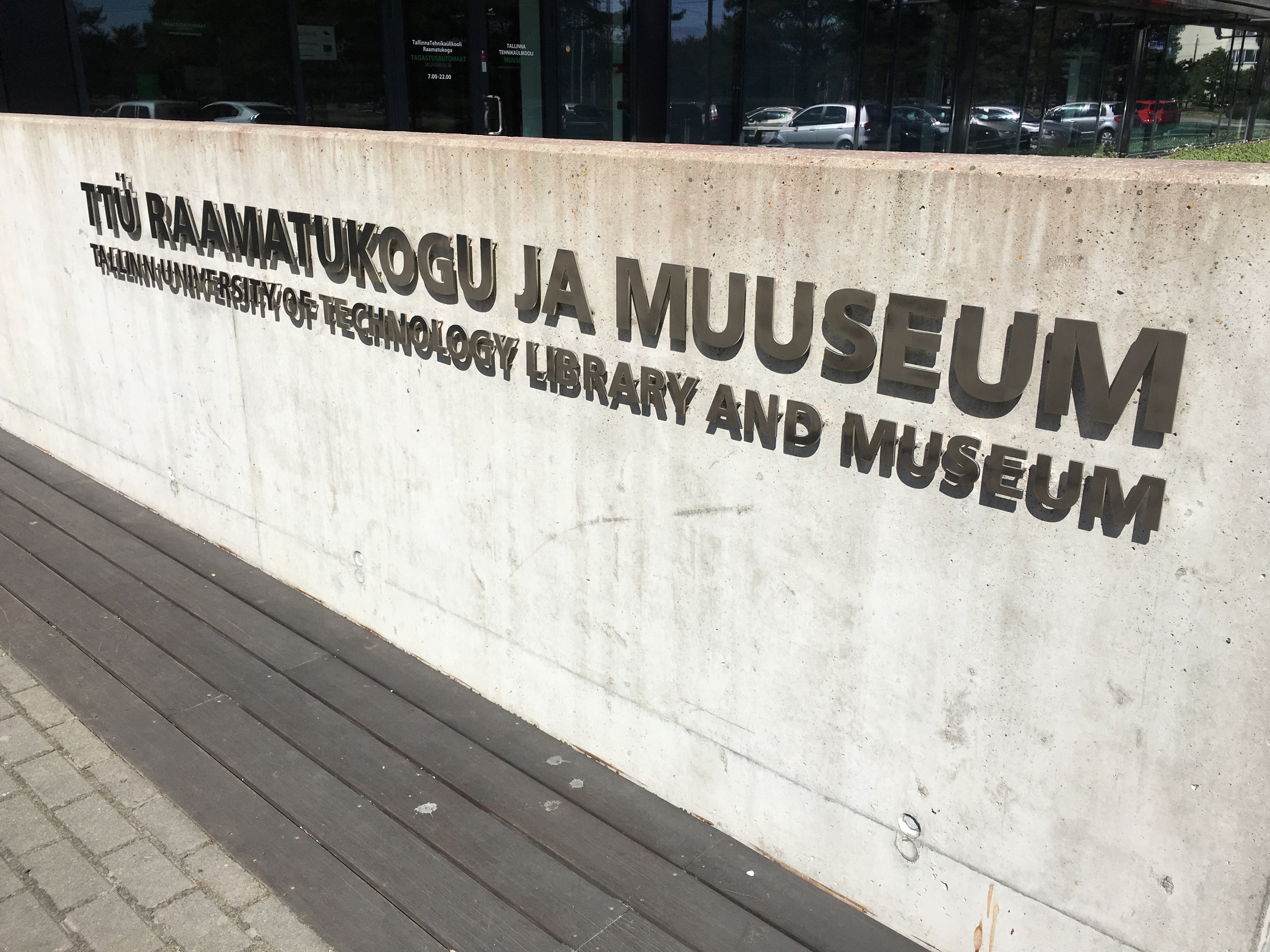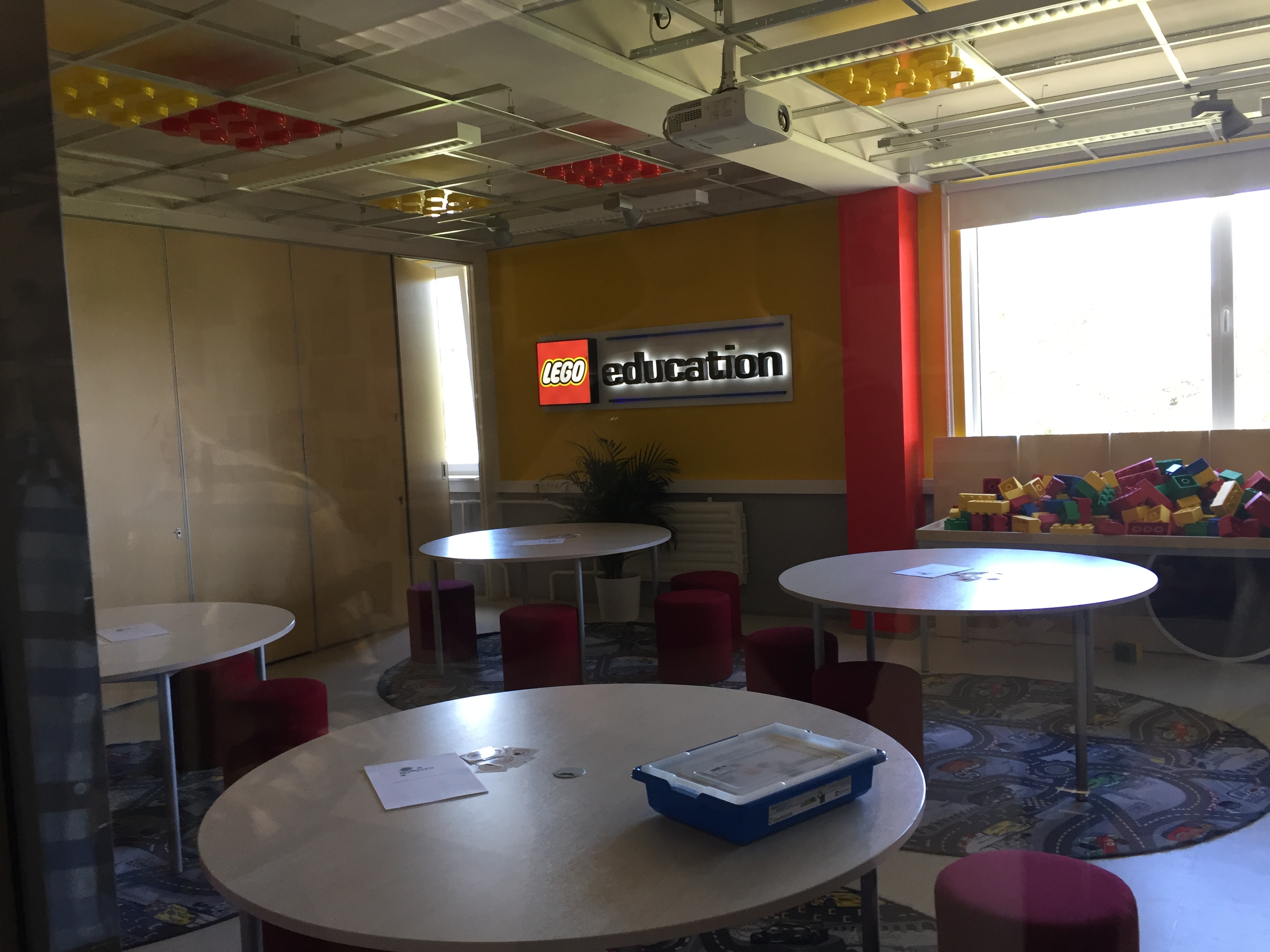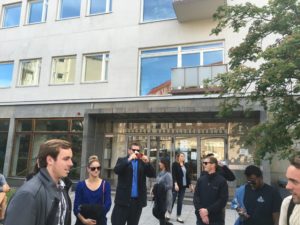During our time in Scandinavia we haven’t just been learning about business culture and practices. We have also taken time to visit Tallinn University of Technical (TUT) and the Hanken School of Economics (Helsinki) to learn about the differences in business school study programs. It was a lot of fun getting to know some fellow business students and comparing our MBA program at Chapman with their MBAs and MSc programs.
Our visit at TUT started with a quick tour where we met some of the staff in Career Services. This was just a short stop on our tour, but it sounds like this part of the program is pretty similar to what we have at Chapman. From there we went to see the Mektory building, which was probably the highlight of our visit. The Mektory is very similar to the Launch Labs at Chapman. Startup  companies can come here for free office space and help in getting their companies off the ground. But the Mektory is much more than a place for entrepreneurs. Companies like Samsung sponsor rooms and provide state-of-the-art technology for students. Students can also use robotics equipment and there is a VR lab coming soon. The coolest part, however, was the ventilation lab in the basement. Here the students were given some leeway in the design. They decided to go with the nightclub atmosphere complete with disco lights and fog machines. Of course, this wasn’t just done in an attempt to make ventilation engineering sound cool. It also is a great way to visualize various ventilation systems at work as the fog is pumped through the machines and lit up under the red and green party lights. The idea of making launch labs more than just practical workspace is a great way to increase creativity and attract students. Perhaps this is an idea Eshwar, our resident entrepreneur, can take back to Chapman.
companies can come here for free office space and help in getting their companies off the ground. But the Mektory is much more than a place for entrepreneurs. Companies like Samsung sponsor rooms and provide state-of-the-art technology for students. Students can also use robotics equipment and there is a VR lab coming soon. The coolest part, however, was the ventilation lab in the basement. Here the students were given some leeway in the design. They decided to go with the nightclub atmosphere complete with disco lights and fog machines. Of course, this wasn’t just done in an attempt to make ventilation engineering sound cool. It also is a great way to visualize various ventilation systems at work as the fog is pumped through the machines and lit up under the red and green party lights. The idea of making launch labs more than just practical workspace is a great way to increase creativity and attract students. Perhaps this is an idea Eshwar, our resident entrepreneur, can take back to Chapman.
Our visit concluded with a presentation by the vice dean. There we learned that there are also some major differences in the way that the MBA program at Chapman and the MBA program at TUT are setup. At Chapman, we use the case study method, as do many American business schools. Our classes focus on real life situations and the practical application of theory. Our capstone classes require a large group project, since much of the work we do in business is team work. At TUT and Hanken, however, students are required to write a Master’s thesis instead of completing capstone projects. The fourth semester of the program is generally reserved entirely for the research and writing of the thesis. This brought about some interesting conversations with our hosts. In the end, students from both sides agreed that there are pros and cons to the American system, which focuses more heavily on practical applications, and of the European system, which places a greater emphasis on theory.
At Hanken, we learned that professors even bring in their own research in to the classroom. This is something that we have not experienced at Chapman, since we tend to use case studies and textbooks instead of peer-reviewed literature (though we do, of course, use peer-reviewed literature when researching for our projects). We think that this is something that we should bring  back with us. Often times, we don’t read our textbooks as thoroughly as we should (professor, you can skip to the last paragraph or keep reading depending on how much you really want to know). We think that the learning experience would be enhanced if we were able to take a deep dive into the research behind the theories, either by having our professors present their own research to us, or by analyzing research papers written by other professors as a supplement to the theoretical learning we get from our textbooks and lectures. And we think that our counterparts in the Nordic countries would appreciate a little more practical application and less focus on abstract theory in their study programs.
back with us. Often times, we don’t read our textbooks as thoroughly as we should (professor, you can skip to the last paragraph or keep reading depending on how much you really want to know). We think that the learning experience would be enhanced if we were able to take a deep dive into the research behind the theories, either by having our professors present their own research to us, or by analyzing research papers written by other professors as a supplement to the theoretical learning we get from our textbooks and lectures. And we think that our counterparts in the Nordic countries would appreciate a little more practical application and less focus on abstract theory in their study programs.
As is often the case when traveling abroad, we ultimately discovered that we have more in common with each other than we might think. Both American and European business students in our generation will face similar  challenges in our future careers, such as how to manage the digital and Internet revolution and how to manage our economies as we undergo major demographic change. And even with the differences in our study programs, we are confident that both we and our new friends in Europe will be able to master these challenges in the coming years.
challenges in our future careers, such as how to manage the digital and Internet revolution and how to manage our economies as we undergo major demographic change. And even with the differences in our study programs, we are confident that both we and our new friends in Europe will be able to master these challenges in the coming years.
So enough talk about school. We’ve got one more blog coming up, in which each of us will share our own personal thoughts on our experience on this trip. Stay tuned!


